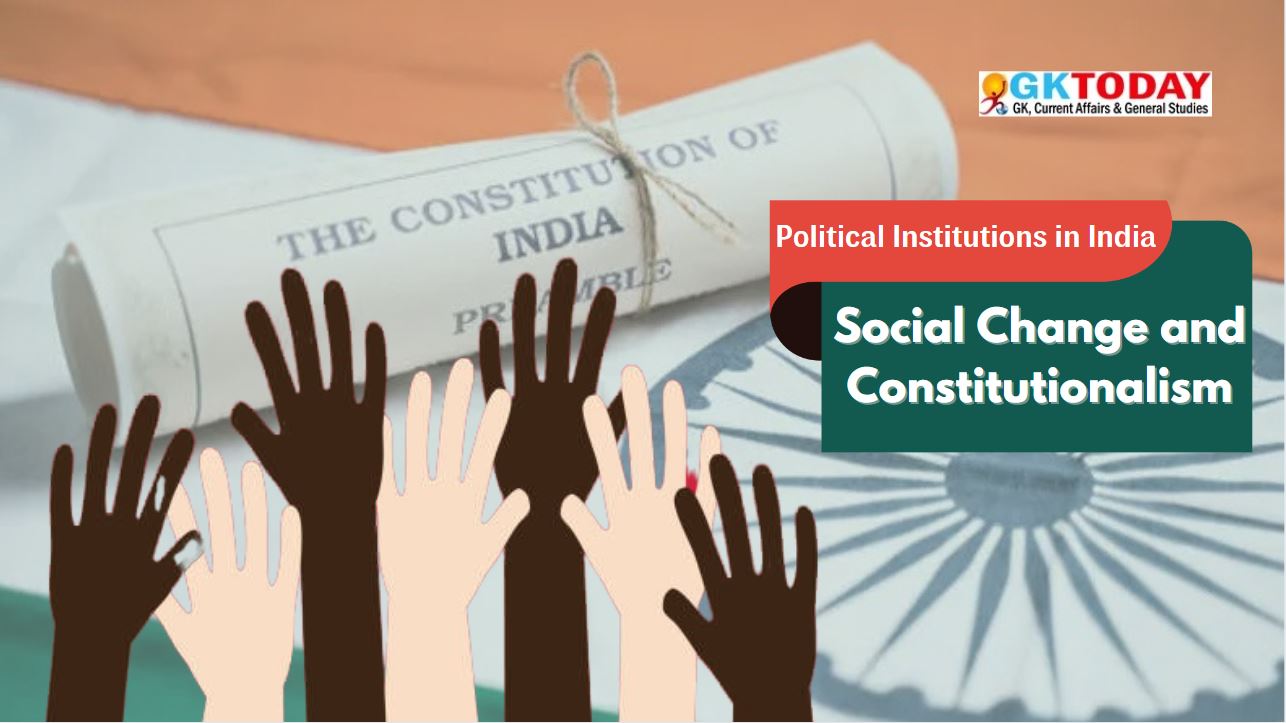Social Change and Constitutionalism in India [UGC NTA NET Political Science Notes]
Social change refers to the transformation of cultural norms, social structures, and values over time. It can occur gradually or rapidly and may be planned or unplanned. In the context of India, the Constitution plays a very important role in facilitating social change. It provides a framework for justice, liberty, equality, and fraternity, which are essential for encouraging an inclusive society.
Definition of Social Change
Social change encompasses various dimensions:
- Transformation in social structures.
- Alteration of cultural norms.
- Shift in values over time.
Social change can be:
- Gradual, such as changes in gender roles.
- Rapid, like the digital revolution.
- Planned, as seen in government policies.
- Unplanned, such as reactions to social injustices.
Constitutional Provisions Related to Social Change
The Constitution of India contains several provisions that promote social change:
Preamble
The Preamble emphasises the core values of:
- Justice
- Liberty
- Equality
- Fraternity
Fundamental Rights
Fundamental Rights are enshrined in Part III of the Constitution. They include:
- Right to Equality (Articles 14-18)
- Right to Freedom (Articles 19-22)
- Right against Exploitation (Articles 23-24)
- Right to Freedom of Religion (Articles 25-28)
- Cultural and Educational Rights (Articles 29-30)
- Right to Constitutional Remedies (Article 32)
These rights ensure that all citizens can participate in social change.
Directive Principles of State Policy
Part IV of the Constitution contains Directive Principles, which guide the state in formulating policies aimed at social welfare and justice. These principles encourage the government to work towards:
- Reducing inequality.
- Providing social security.
- Ensuring access to education and health care.
Role of the Constitution in Promoting Social Change
The Constitution has been instrumental in promoting social change through various provisions:
Abolition of Untouchability
Article 17 of the Constitution abolishes untouchability. This provision aims to eliminate caste-based discrimination and promote social equality.
Affirmative Action
The Constitution provides for affirmative action, including reservations for Scheduled Castes, Scheduled Tribes, and Other Backward Classes. This policy aims to uplift historically marginalised communities.
Empowerment of Women
Laws and policies have been enacted to empower women. Examples include the Protection of Women from Domestic Violence Act (2005) and the Sexual Harassment of Women at Workplace Act (2013).
Social Movements and Constitutionalism
Social movements play a vital role in advocating for constitutional rights and reforms. They raise awareness and mobilise public support for social change.
Dalit Movement
The Dalit movement seeks social justice and equality for Dalits. It has led to policy changes and greater awareness of caste discrimination.
Women’s Rights Movement
The women’s rights movement advocates for gender equality. It has achieved milestones like the enactment of laws against domestic violence and sexual harassment.
Environmental Movements
Environmental movements focus on sustainable development. They highlight the need for ecological conservation and have influenced policy decisions at various levels.
Judicial Activism and Social Change
Judicial activism has played important role in interpreting the Constitution to promote social justice. The Supreme Court and High Courts have issued landmark judgments that have impacted social change.
Vishaka vs. State of Rajasthan (1997)
This case established guidelines against sexual harassment at the workplace. It marked step towards protecting women’s rights in India.
Navtej Singh Johar vs. Union of India (2018)
This landmark judgment decriminalised Section 377, which criminalised homosexuality. It was victory for LGBTQ+ rights in India.
Shayara Bano vs. Union of India (2017)
This case addressed the issue of instant triple talaq, declaring it unconstitutional. It aimed to protect the rights of Muslim women.
Challenges to Social Change
Despite constitutional provisions, challenges to social change persist:
Resistance from Traditional Structures
Traditional norms and structures often resist changes. Caste and gender biases still influence societal attitudes.
Socio-Economic Disparities
Socio-economic inequalities hinder social change. Access to education and resources remains uneven, affecting marginalised communities.
Political Factors
Political parties influence social policies. Their agendas may not always align with the needs of the most vulnerable sections of society.
Impact of Globalization on Social Change
Globalisation has influenced social change in India:
Influence of Global Norms
Global norms and values have permeated Indian society. Concepts like human rights and gender equality are increasingly accepted.
Changes in Lifestyle
Globalisation has altered consumption patterns and lifestyles. The rise of consumer culture reflects changing values, especially among the youth.
Role of Technology
Technology and social media have become powerful tools for mobilising social change. Campaigns for social justice often gain traction online, reaching broader audiences.






